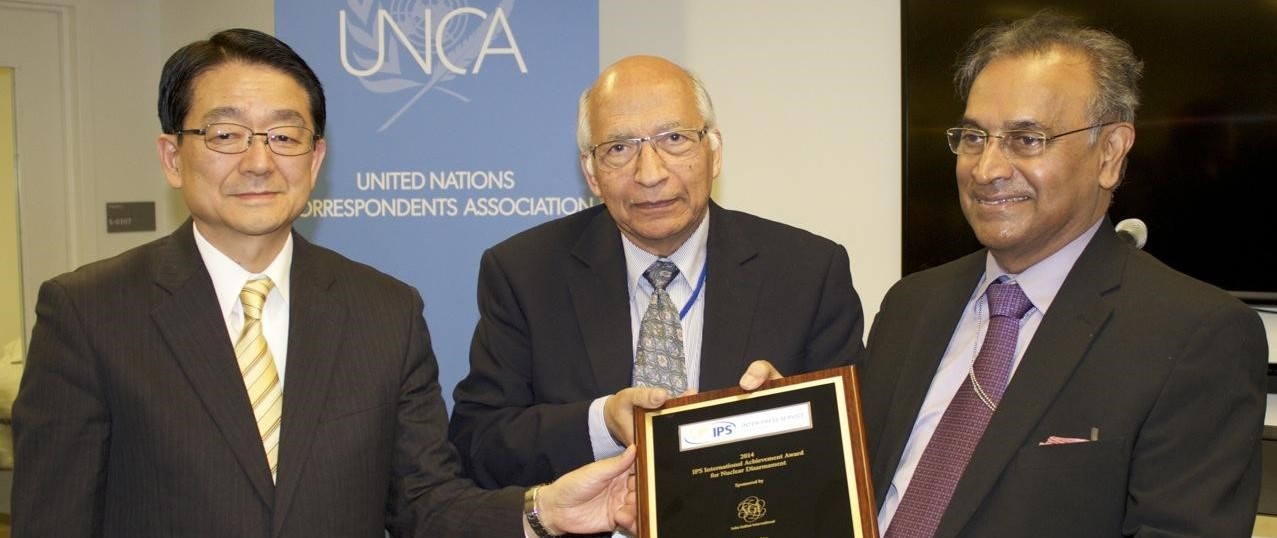by Fiachra Ó Raghallaigh.

Jayantha Dhanapala, a keynote speaker at the international conference Building a Nuclear Weapon Free World, is one of the most successful diplomats in the nuclear disarmament field. Fiachra O Raghallaigh, Researcher for the World Future Council, reflects on some of his successes.
Have you ever asked yourself how world leaders, with their multitude of foreign policy perspectives and priorities, could ever hope of achieving a world without nuclear weapons?
Certainly, the challenges seem despairingly great. Luckily, humanity can count on diplomats such as, Jayantha Dhanapala who has played a leading role in some of the most important arms control and disarmament negotiations – such as the NPT Review and Extension Conference of 1995 and the Central Asian Nuclear Weapon Free Zone. Since 2007 he has been the President of the Pugwash Conferences on Science and World Affairs. It is with this weight of experience that he speaks in Astana on the theme “Building a Nuclear Weapon Free World”.
In 1995, the Nuclear Non-Proliferation Treaty was set to expire. Originally envisaged in 1970 as a stop-gap treaty until a global nuclear disarmament agreement was reached, the treaty was about to expire with no such follow-on agreement. The States Parties to the NPT met to consider whether to extend the NPT, and it so for how long and with what conditions. The Nuclear Weapon States (NWS) wanted indefinite extension of the treaty. Many non-nuclear States wanted a limited extension in order to put pressure on the NWS to fulfill the nuclear disarmament obligation.
Jayantha Dhanapala – as Sri Lanka’s Ambassador to the United Nations – served as President of the NPT Review and Extension Conference, one of the toughest diplomatic tasks ever.
With no consensus, a vote looked imminent, something which would weaken the treaty. Dhanapala managed to achieve a diplomatic coup by achieving a ‘consensus agreement that the majority support indefinite extension’. This enabled the treaty to be extended without a vote, and also enabled the adoption of nuclear disarmament conditions such as the achievement of a Comprehensive Test Ban Treaty, support for a Middle East nuclear weapons free zone and a strengthened review process to implement the disarmament obligation.
Dhanapala, refused to take credit for this genius of diplomacy, knowing full well that if he gave credit to the governments, they would then ‘own’ and implement the outcome. He modestly claimed that “The President of a conference is not a magician who can produce a rabbit out of a hat. The rabbit must be in the hat and must want to come out. All we can do is to coax it occasionally.”
However, before Dhanapala’s intervention there was no consensus on whether a rabbit existed, and whether during previous the 25 years of the NPT’s existence it had died. The eventual compromise brokered by Dhanapala involved the indefinite extension of the NPT, as the nuclear armed states wished, as well as the strengthening of the NPT review process, as the non-nuclear states wanted.
The 1995 NPT outcome would have been enough by itself to enter Dhanapala’s name in the history books, but his international career was still far from over.
As UN Under-Secretary-General he helped to mediate the negotiations leading to the Central Asian Nuclear Weapon Free Zone Treaty. Under this treaty, the five Central Asian States of Kazakhstan, Kyrgyzstan, Tajikistan, Turkmenistan and Uzbekistan have agreed to prohibit the use, threat of use, production, possession and deployment of nuclear weapons in all five countries. The zone also includes protocols for the NWS to respect the zone, which at first they were hesitant to do. Owing in no small way to Dhanapala’s diplomatic efforts, the NWS have now agreed to respect the Nuclear Weapon Free Zone, forswearing the threat or use of nuclear weapons against the Central Asian states.
In 2007, Dhanapala was appointed President of Pugwash Conferences on Science and World Affairs, established following the joint manifesto written and published by Bertrand Russell and Albert Einstein in 1955.
The Russel-Einstein manifesto highlighted the dangers posed by nuclear weapons to humanity, and called for a series of conferences where scientists would consider these dangers. Though Einstein never lived to attend the first conference which was held in Pugwash, Nova Scotia, it would have given him much just cause for pride. Throughout the Cold War, the communication Pugwash established between scientists on both sides of the iron curtain was essential for achieving multiple diplomatic breakthroughs such as the Partial Test Ban Treaty and the Non-Proliferation Treaty. Owing to the success of this “Type II Diplomacy”, Pugwash along with its co-founder Joseph Rotblat was awarded the Nobel Peace Prize in 1995.
Dhanapala has brought his expertise in international diplomacy to Pugwash in order to elevate its influence in world affairs.
Pugwash, in Jayantha Dhanapala’s analogy, helps to ensure that the rabbit of nuclear disarmament is sitting ready to come out of the hat when world leaders decide that the time is right. And for this to happen, we need more patient, dedicated and able diplomats like Dhanapala to help leaders negotiate and implement agreements to rid the world of nuclear weapons.
Fiachra Ó Raghallaigh is a masters student at the Graduate Institute for International and Development Studies in Geneva. He is currently interning with the World Future Council.
